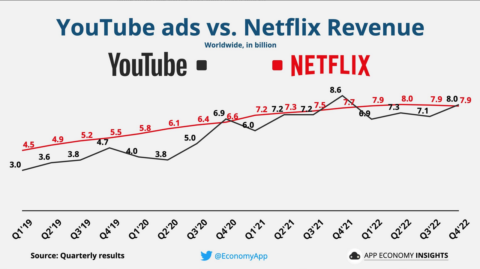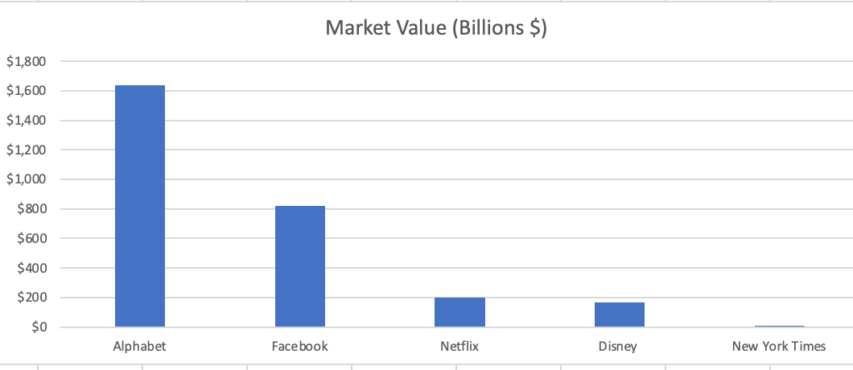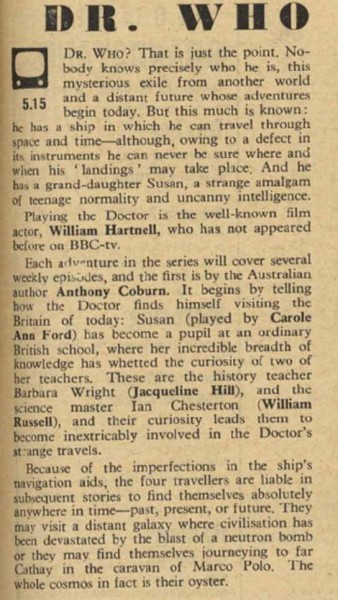Aididan
Published 13 Aug 2023Top Gear is one of the most bizarre shows to ever exist. Not because of the quality of the show or anything, but rather because of how it evolved over the course of its existence. What exactly is it about Top Gear that makes it so special? Well, watch the video and find out.
Or don’t, I’m not your mother.
December 14, 2023
What Top Gear Really Meant
December 12, 2023
Rolling a Reliant Robin | Top Gear | BBC
Top Gear
Published 26 Nov 2010Jeremy takes the extreme sport of Reliant Robin rolling to the streets of Barnsley, aided by a string of celebrities who just happen to be on hand to help keep the fabled three-wheeler upright.
(more…)
December 9, 2023
The coming Micro-Macro culture war … and who’s going to win it
Ted Gioia outlines the dismal state of the “macro” culture — television, movies, newspapers, book publishing and all the big corporations that control them — with the dynamism of the “micro” culture:
In the beginning, all culture was microculture.
You knew what was happening in your tribe or village. But your knowledge of the wider world was limited.
So you had your own songs and your own stories. You had your own rituals and traditions. You even had your own language.
But all these familiar things disappeared when you went off into the world. That was dangerous, however. That’s why only heroes, in traditional stories, go on journeys.
You learn on the journey. But you might not survive.
But all that changed long before I was born.
In my childhood, everything was controlled by a monoculture. There were only three national TV networks, but they were pretty much the same.
When I went to the office, back then, we had all watched the same thing on TV the night before. We had all seen the same movie the previous weekend. We had all heard the same song on the radio while driving to work.
The TV shows were so similar that they sometimes moved from CBS to NBC, and you never noticed a change. The newscasters also looked pretty much the same and always talked the same — with that flat Midwestern accent that broadcasters always adopted in the US.
The same monoculture controlled every other creative idiom. Six major studios dominated the film business. And just as Hollywood controlled movies, New York set the rules in publishing. Everything from Broadway musicals to comic books was similarly concentrated and centralized.
The newspaper business was still local, but most cities had 2 or 3 daily newspapers — and much of the coverage they offered was interchangeable. Radio was a little more freewheeling, but eventually deregulation allowed huge corporations to acquire and standardize what happened over the airwaves. [NR: I suspect the “freewheeling” went away once the government started imposing regulations, and the corporate consolidation was enabled when they “deregulated” the radio licensing regime several decades later.]
When I went to work in an office, back then, we had all watched the same thing on TV the night before. We had all seen the same movie the previous weekend. We had all heard the same song on the radio while driving to work.
And that’s why smart people back then paid attention to the counterculture.
The counterculture might be crazy or foolish or even boring. But it was still your only chance to break out of the monolithic macroculture.
Many of the art films I saw at the indie cinema were awful. But I still kept coming back — because I needed the fresh air these oddball movies provided. For the same reason, I read the alt weekly newspapers and kept tabs on alt music.
In fact, whenever I saw the word alt, I paid attention.
That doesn’t mean that I hated the major TV networks, or the large daily newspaper, or 20th Century Fox. But I craved access to creative and investigative work that hadn’t been approved by people in suits working for large organizations.
The Internet should have changed all this. And it did — but not much. Even now the collapse in the monoculture is still in its early stages.
But that’s about to change.
If you don’t pay close attention, the media landscape seems pretty much the same now as it did in the 1990s. The movie business is still controlled in Hollywood. The publishing business is still controlled in New York. The radio stations are still controlled by a few large companies. And instead of three national TV networks plus PBS, we have four dominant streaming platforms — who control almost 70% of the market.
So we still live in a macro culture. But it feels increasingly claustrophobic. Or even worse, it feels dead.
Meanwhile, a handful of Silicon Valley platforms (Google, Facebook, etc.) have become more powerful than the New York Times or Hollywood studios or even Netflix. It’s not even close — the market capitalization of Google’s parent Alphabet is now almost ten times larger than Disney’s.
But here’s the key point — these huge tech companies rely on the microculture for their dominance.
Where is Facebook without users contributing photos, text and video? Where is Google’s YouTube without individual creators?
In terms of economic growth or audience capture, the microculture has already won the war. But it doesn’t feel that way.
Why not?
First and foremost, Silicon Valley is a reluctant home for the microculture. To some extent Alphabet and Facebook are even going to war with microculture creators — they try to make money with them even while they punish them.
- So Mark Zuckerberg needs creators, but won’t even let them put a live link on Instagram and limits their visibility on Facebook and Threads.
- Alphabet needs creators to keep YouTube thriving, but gives better search engine visibility to total garbage that pays for placement.
- Twitter also claims it wants to support independent journalists — but if you’re truly independent from Elon Musk, your links are brutally punished by the algorithm.
This tension won’t go away, and next year it will get worse. The microculture will increasingly find itself at war with the same platforms they rely on today.
And legacy media and non-profits are even more hostile to emerging media. Go see who wins Pulitzer Prizes, and count how many journalists on alternative platforms get honored.
I’ll save you the trouble. They don’t.
December 8, 2023
The Real Betty Crocker’s Pineapple Upside Down Cake
Tasting History with Max Miller
Published 22 Aug 2023
(more…)
December 4, 2023
Jeeves and Wooster, in a nutshell …
Barcode
Published 11 Oct 2021A summary of the entire Jeeves & Wooster series in roughly 6 minutes.
P.G. Wodehouse’s Jeeves (played by Stephen Fry) and Bertie Wooster (Hugh Laurie) have been lauded as one of the greatest comic double acts of all time. Set in the late 1920s-1930s, Jeeves and Wooster (1990-1993) follows the hilarious misadventures of Bertram Wilberforce Wooster — a young, affable English gentleman of the idle rich — and Jeeves — Bertie’s omniscient and resourceful valet. Jeeves discreetly takes control of his “mentally negligible” employer’s life, while Bertie Wooster finds himself pushed and reeled into countless imbroglios, fiascoes, and romantic entanglements led by his hapless friends and imperious aunts. But each disaster is drawn to its own satisfactory conclusion through a concatenation of intriguing coincidences … or so they would seem. Until, that is, the silent force behind every “coincidence” is revealed to be none other than the brilliant and inimitable Jeeves.
(more…)
December 3, 2023
Doctor What-are-your-pronouns
I don’t watch Doctor Who although I have fond childhood memories of watching William Hartnell and Patrick Troughton’s respective “Doctors” and I caught one or two episodes of Jon Pertwee and Tom Baker in the role. That the show is still running on British TV is a wonder … but it got headlines for a recent installment that had the Doctor being told off for “assuming” an alien creature’s pronouns:
Remember when Doctor Who was fun? Watching it now is about as much fun as being publicly humiliated at work by some jumped-up nonbinary form-filler from HR who thinks he’s amazing because he’s painted one of his fingernails black.
A good example of this joylessness is a scene in the most recent special, “The Star Beast”, which has been treated by right-on broadsheet types as a moment of profound importance. Yet all that happened was a transwoman character – played by transwoman actor Yasmin Finney – lectured the Doctor about pronouns. In a moment of unforgivable Time Lord-cis privilege, the Doctor had assumed a diminutive alien called Beep the Meep used male pronouns. What was he thinking?
It is this sort of banal plot line that encapsulates the shrivelling ambition of science fiction. Once the genre dared to hold up a provocative mirror to contemporary society. From Mary Shelley’s Frankenstein to Octavia Butler’s Parable of the Sower, sci-fi challenged lazy assumptions. Now it revels in groupthink that feeds the collective self-righteousness of indolent teenagers and adults with teenage imaginations.
This matters, because at its best sci-fi can dazzle and even inspire us with the potential strangeness of the imagined future. A few years ago I made a series presented by William Shatner tracing the cultural and technological influence of Star Trek. In one episode, the inventor of the mobile phone, Martin Cooper, told director Julian Jones how he had been inspired by the example of Captain Kirk’s hand-held “communicator”. Will anyone invent something inspired by the new Doctor Who? A new set of guidelines for pronoun use, perhaps?
You can tell how out of touch Doctor Who has now become by the fact its enormously pompous showrunner, Russell T Davies, seemed to think that the new series would shock viewers with its “progressive” radicalism. The only shock was the alien pronoun scene’s patent stupidity.
I mean, why on Earth would the Doctor assume the gender of any alien? He has been encountering aliens with no fixed gender since the 1960s. The Doctor has effectively been asking aliens for their pronouns for nigh on 60 years.
Davies may think he’s blazing a trail with the new series of Doctor Who. But the truth is that gender-bending in science fiction is as old as the frozen hills of Gallifrey. In The War of the Worlds, published 125 years ago, HG Wells regaled us with Martian invaders who reproduced asexually. And hermaphrodites pepper sci-fi, from the work of Philip K Dick to that of Ursula K Le Guin.
December 2, 2023
QotD: Western media and Putin’s war
Regarding [Vladimir Putin’s] Magical Mystery War, I’m going with the stoyak that the casualty counts peddled by the [western media] is part of a very very old playbook which various Western observers have peddled since 1905-that of Russian stupidity and indifference to casualties. Russia loses a war? They’re stupid gopniks who flung their soldiers into meat grinders until they rebelled (1905 or 1917). Russia wins a war? They’re stupid gopniks who flung their soldiers into meat grinders until they won (1945, 2023). Note that you can effortlessly pivot your propaganda when it becomes obvious in hindsight the outcome of the war. This becomes very important when [Putin] negotiates his 18th century kabiniettskreig ending to the war, since nobody in the West, especially AINO, understands how a cabinet war is fought, much less ends. They will claim that they foiled Putin’s plan for conquering all Ukraine (which he never has wanted) by killing hundreds of thousands of poor, oppressed, stupid, vodka-fueled gopniks used as cannon fodder who simply overwhelmed the valiant forces of good by sheer numbers. Not by superior strategy or tactics, or weapons, but the good ol’ Russian sledgehammer. Just like Hitler’s excuse in 1945, when Ivan was knock knock knockin’ on his bunker door. His generals who survived carried that piece of gospel West when the US Army started studying how to fight the Reds and asked the Germans how they did it. Their answer was happily embraced by the next generation of Very Clever Boys in the 1960s and carried forward to today’s Fistagon — Wunderwaffen.
Pickle Rick, commenting on “Friday Mailbag”, Founding Questions, 2023-12-01.
November 25, 2023
“Three or more reporters, arranged in a scrum … are dumber together than any of them alone”
I’m not a fan of the legacy media, although I’ve met good folks who worked or still work in the field, and the modern incarnation of the media has become so much more transparently a PR team for the big progressive wet dreams of bigger and bigger government and more and more centralized control over peoples’ lives. I’ve never met Paul Wells, but he’s respected by some of the media people I’ve met and generally has interesting things to say, perhaps more so that he’s his own boss and publishes on Substack these days:
One reason I don’t like to play along with subscribers who assume this newsletter is a running critique of “the mainstream media” is that I know too many journalists. The best ones are wonderful and most are fine. Most are better at some part of the craft than I am. They don’t hesitate to make that fourth or fifth call, they’re forever willing to butt their heads against the surreal access-to-information regime, they understand interest rates, whatever. They often (not always!) admit errors publicly, which gives the occasional schoolyard bully a chance to make fun of them for doing what bullies never do. Many have an appropriately tragic sense of what it means to work in an industry that has been collapsing for 20 years.
But as a robust rule, reporters don’t mass well. Three or more reporters, arranged in a scrum — the term of art for an impromptu news conference that the newsmaker can leave at any moment — are dumber together than any of them alone. I caught glimpses of this early on. The first time I ever had to scrum a prominent politician at an important moment, I couldn’t believe how bad most of my more experienced colleagues’ questions were. My National Post column and my first book often featured satirical descriptions of scrum dynamics. But it really got bad when Stephen Harper was prime minister.
Harper was a master at generating dumb scrums. The ingredients for a dumb scrum are (1) pre-existing mutual animosity between newsmaker and reporters; (2) a tight limit on time or the number of permitted questions; (3) a few minutes before the scrum to allow the reporters to work on ways to maximize their advantage. This last is not essential but it’s a tremendous catalyst of dumbness, because reporters who are trying to select the best questions always ask worse questions.
If 10 reporters know they will only have time for two to four questions, their responses become predictable. They will need to “get him” (the newsmaker) on “the story of the day”. That is, they need to collect audio and video clips of the newsmaker talking about a dramatic event that happened within the last several hours. That’s because broadcast has room for fewer words than print does, so broadcast’s needs are more rigid. It’s simply pointless to urge colleagues before a scrum to get the newsmaker reminiscing about his youth, or to drag up some disagreement from 2019 that might be newly relevant, or to debate the fine points of trade law. The questions that work in scrums are of the “Aren’t you …” or “Didn’t you …” kind.
Unfortunately, such questions are child’s play to defuse. A junior staffer can tell her cabinet minister what to expect in a scrum, and in 70 guesses over a month she might be wrong three times. Scrum questions are always narrow and pointed, even though every reporter learned early that it’s their very narrowness that makes such questions easy to dodge. “Aren’t you siding with the convoy protesters when you …?” “Not at all. I’m calling for basic fairness.”
Often, the goal in a scrum is to record the newsmaker confessing to a terrible error, ideally a complete moral breakdown. Sometimes it’s not even personal, although the aforementioned pre-existing mutual animosity definitely helps. It’s just that it would be fantastic radio if the newsmaker did collapse in an audibly self-incriminating heap. This too is an easy bullet to dodge. Once I know you are trying to get me to confess my soulless incompetence, all I have to do is talk about anything else, and I win.
Dumb scrum dynamics are hard to avoid. They’re the product of simple physics — there is no time for a thoughtful exchange — mixed with collegial generosity. Reporters with more complex ambitions have to take one for the team, so the clip people can get their clip. None of the rules I have described is set in stone. In 2015 I spent several days covering Stephen Harper’s last campaign, and my colleagues let me simply ask my questions without telling them what I’d ask. But I had to do it in rotation, which meant I got two questions in a week. Meanwhile most of them worked together to concoct questions he could see coming from a mile away.
QotD: Political language mirrors the ritualized nature of political life
Elected officials speak in a language that’s unique to their status group. If you’ve ever tried to attend a city council or school board meeting, you’ve watched them open with the onanistic portion of the thing, handing out certificates and doing grip-and-grins. “Bob, I just want to echo your wonderful comments about this amazing program.” They see themselves first, then others of their class, then they go blind. The first duty of a public official is to take a lot of selfies.
In a crisis, they recite. We’ve all watched them do this. “This is not who we are.” “Let me be clear: Hate has no home here.” You know what they’re going to say before they say it, and you know the tone before you hear it. The current mayor of Los Angeles is very fond of “our message has been very clear” and “we’re going to link arms and stand together”, so you’re not surprised to hear her respond to a question with something like, “Well, Maria, thank you for that great question. Our message has been very clear: We’re going to link arms and stand together.” Listening to elected officials speak is qualitatively different than listening to people speak. They perform the ritual behaviours of their status group.
[…]
They become debilitated by a lifetime of ritual language. If a staffer hasn’t told them to look somber and say “I’m sorry for your loss”, they don’t know how. It isn’t a line they’ve been equipped with for the event. Hey man your kids burned to death I almost lost my Corvette once, man. All kiddin’ aside, man!
[…]
They aren’t people anymore. They can’t talk like people. They don’t have normal human affect. What’s particularly interesting is that this learned inability to read human cues is recent and narrow. Bill Clinton, as much a politician as anyone who has ever lived, had a well-known ability to see people and signal his empathy, or at least to do a brilliant job of faking it. Similarly, Donald Trump is obviously very very fond of Donald Trump, who is amazing, trust me, everybody says so, but he has a normal human ability to spontaneously bullshit with the normals. Elite disconnection isn’t inevitable.
The broken personal thing behind all the broken institutional things is a loss of basic human connection and behavior. It’s a learned disconnection, and they can’t hide it.
Chris Bray, “The Mask Becomes Your Face”, Tell Me How This Ends, 2023-08-22.
November 5, 2023
October 27, 2023
Two wild-eyed optimists claim that things aren’t as bad as you think
Who lets these dangerous lunatics talk to the press? If anyone listens to them, they may get unwarranted optimistic notions that go against the narrative:

Jordan Peterson speaking at an event in Dallas, Texas on 15 June, 2018.
Detail of a photo by Gage Skidmore via Wikimedia Commons.
War is endlessly and eternally horrific. It is understandable and even necessary that the media spotlights today’s conflicts. But this can make us believe that we’re living through unprecedented violence. Russia’s war indeed meant that battle deaths in 2022 reached a high for this century, but they are still very low by historical standards. Last year, 3.5 in 100,000 people died as a consequence of war, below even the 1980s and far below the 20th-century average of 30 per 100,000. The world has in fact become much more peaceful.
This is of course little consolation to those living in conflict zones. But the data speaks to the problem with the constant barrage of contextless catastrophe and doom. Analysis of media content across 130 countries from 1970 to 2010 indicates that the emotional tone has dramatically and consistently become more negative. Negativity sells, but it informs badly.
The same pattern characterizes climate change reporting. A pervasive and false apocalyptic narrative draws together every negative event — ignoring the bigger picture almost entirely. Last summer, for example, forest fires made headlines, but coverage largely failed to mention that the annual burned global area has been declining for decades, reaching the lowest level ever last year. Likewise, deaths from droughts and floods make fill the front pages, but we don’t hear that deaths from such climate-related disasters have declined 50-fold over the past century.
The data show what we all fundamentally know: the world has improved dramatically. Life expectancy has more than doubled since 1900. Two centuries ago, almost everyone was illiterate. Now, almost everyone can read. In 1820, nearly 90 per cent of people lived in extreme poverty. Now it’s less than 10 per cent. Indoor air pollution has declined dramatically, and its outdoor equivalent has also done so in rich countries. If we could choose when to be born, having all the facts at hand, few would choose any time before today.
This incontrovertible progress has been driven by ethical and responsible conduct, trust, well-functioning markets, the rule of law, scientific innovation and political stability. We have to recognize, appreciate and proclaim the value, and comparative rarity, of each of these.
The constant barrage of negative stories may lead us to imagine that our forward progress is about to end. However, the evidence at hand does not support this conclusion. The latest Intergovernmental Panel on Climate Change scenarios indicate that, if not for climate change, the average person would be 4.5-times richer by the end of the century than they are today.
October 20, 2023
QotD: The Gen-X-Files
Just to take one small example, The X-Files was hitting its stride in 1994, and I was smack dab in the target demo: Nerdy college dude. And yet, all the show’s basic assumptions rubbed me wrong. Mulder was obviously supposed to be cool, but as I saw it, the show went out of its way to make him look like a loser — no girlfriend, no family, not even a pet, spanks it to porn (an at least somewhat risqué thing to imply on network tv, even at that late date). More than that, though, was the show’s attitude towards the government. You’re asking me to believe that the government — Bill Clinton’s government — is competent enough to keep an alien conspiracy under wraps?
I wasn’t in any way political back then. If forced to pick a side, I’d have been reflexively liberal, like all college kids are. I didn’t know the first thing about what was going on out in the world, let alone in the corridors of power in Washington, but even I found that pretty farfetched.
More importantly, the zeitgeist I saw was rapidly changing. X Files creator Chris Carter was born in 1956 and grew up in sunny SoCal (his wiki entry makes sure to give us his favorite surfing stance), so he more than most probably wrestled with the dilemma of how to bring Flower Power into Ronald Reagan’s 1980s. Hence the weird disconnect of the early 1990s, when Bill Clinton got his groovy, greasy, chicken-fried hippie self into the White House: The same people who, in their own college days, had nothing but hatred for the CIA and their domestic Mini-Me, the FBI, were all of a sudden kinda sorta coming around on the idea that The Feds are our friends — since, you know, the Feds are now us. It’s probably not a coincidence that Agent Mulder, FBI, was the star of The X-Files.
Explains a lot about “Gen X”, don’t it? When every single authority figure in your life, from the President on down, tells you to Fight the Power, the only way out of the clown show is to be, you know, like, whateverrr about everything — learned helplessness, 1994 version.
But smoked-out, flannel-clad, and apathetic is no way to go through life, and so we turned into a generation of suck-ups and toadies. Oh, the lunatic Marxists in the Teachers’ Unions want to encourage kids to “transition” in elementary school. Dude … you know, like, whateverrr. The college kids of 1994 are the middle managers, the Deep Staters, the lever-pullers of 2021. It’s working out about as well as you might’ve expected. You don’t need Agent Mulder to solve this mystery.
Severian, “1994”, Rotten Chestnuts, 2021-04-15.
October 17, 2023
QotD: Representations of sex work in SF
Whether they were “Socialators” in Battlestar Galactica, or “Companions” in Firefly, or any number of other euphemisms, one SF trope that seems particularly insidious, especially in movies and TV, more-so than in literature, although it is still prominent there, is turning the world’s oldest profession into something glamorous and honorable, even exalted. I recently had the misfortune to read a book where they took “Make Love, Not War” literally, and all women were drafted at 18 to serve a couple years in a sex corps to keep the peace, under the idea that a free and easy sexual outlet was all it took to quell man’s violent nature. (This was only a background element, not the main focus of the story, but on the other hand, the primary plot about laser light shows being the most highly regarded form of art wasn’t particularly compelling either. And don’t get me started on how unlikable the characters were.)
Maybe it’s a relic from when SF was just another facet of Men’s Adventure magazines, or maybe it’s capitalizing on the stereotypical basement-dwelling Geek’s desire to have high quality women to command at the wave of a few credits or gold pieces. Or, more cynically, it’s the desire of Hollywood producers who actually DO have high quality women at their mercy, career-wise, to further normalize the idea that “Sex work is real work” to help smooth away the resistance to their hamfisted efforts on the casting couch.
TV Tropes has a number of entries about this, from “Unproblematic Prostitution” to “High Class Call Girl”. Writers like to call up the imagery of the Geisha, and make their Space Hookers come across as brilliant sexual artists, with additional talents that help the protagonists, such as advanced degrees or connections to corporate executives and high ranking government officials. (Funny how they are not corporate movers and shakers or government officials themselves …). They forget, of course, that Geisha were not actually prostitutes, and only rarely took lovers. There were still actual brothels in Japan for that sort of thing.
Science Fiction has gotten a lot more difficult to write as the frontiers of reality have pushed back against the flights of fantasy. We have had to accept that you can’t get to the moon inside a Victorian upholstered artillery shell, or set foot on the Jungles of Venus. And maybe that’s why a lot of SF in recent decades has turned towards the softer sciences where theories are more prominent than scientific facts, making it simpler to speculate.
However, even in our understanding of society, there are some realities that can’t be ignored. A few of them are listed in the aforementioned “Unproblematic Prostitution” entry. The primary social reality that undermines all of the tropes is that when you commodify sex, you are putting women on sale. Maybe it’s just fractionally, for a few hours out of her lifetime, but when your fantasy/SF hero comes along and waves a few C-notes to get a woman to do what he wants, it’s not the “Combination of Sex and Capitalism” (“… which are you against?” the excuse goes) but the sublimation of Sex TO Capitalism.
“Sex work is real work,” they like to say, but when you turn sex INTO work, it strips it of all of its better qualities. “Do what you love and you’ll never work another day in your life,” is another lie. I’ve known too many artists who go from having a fun hobby to chasing unsatisfying commissions, eventually burning out from endless requests by cretins for illustrations of their vilest fantasies. So the idea that our happy Space Hookers are having fun and getting paid, and what’s wrong with that, turns into burnout in pretty short order, because the kind of guys who go out looking for “That kind of girl” are not interested in the parts of sex that make it as enjoyable as it is for a compatible couple. They don’t have girlfriends for a reason. So the trope that Prostitution is just Sexy Fun Time falls by the wayside in the face of human nature.
SF also likes to postulate that science will make sex consequence free with perfect contraception and cures for all diseases. Writers and Producers fail to see the actual social costs and secondary effects, some of which we are finally running afoul of today, as women are aging out of their “Hookup culture” days and finding themselves alone and with few prospects for a lasting relationship, while at the same time human reproduction is falling below the replacement rate worldwide. And of course, nature being what it is, there will always be new diseases from new planets or new alien races or who knows WHAT our horny young space cadets have been sticking their dicks into. Human biology has less security in its OS than a Commodore 64.
Dr. Mauser, “Space Hookers Must Die!”, Shoplifting in the Marketplace of Ideas, 2023-07-16.
October 15, 2023
Training and educating for unseriousness
Theophilus Chilton on the many ways our education and entertainment industries inculcate trivial and easily distracted habits in both children and young adults:
Any thinking American has surely observed that our culture and society are growing more and more immature, childish, and unthinking with each passing year. In previous articles, I’ve noted this immaturity, as well as the tendency (neither coincidental, nor accidental) to make Americans more and more dependent upon the Regime for even the most basic needs of life. There are several interrelated cultural and political agendas at work which have systematically worked to create this state of affairs among the American people – and these are largely the work of social and political “progressivism”, the handiwork of the Left. Let’s face it – it is to the benefit of left-wingers to cause as many people as they possibly can to be dumb, distracted, and therefore destitute of the ability to think for themselves or to successfully reason their way into informed opinions about complex social and economic issues.
One of the major ways in which the Left dumbs down the American population is through the public education system. What people need to understand is that progressives are not genuinely interested in our children receiving a thorough and useful education, no matter how much they may squawk about “funding” and whatnot. For the Left, publik skoolz are merely a means by which to propagandize children to a progressive worldview while simultaneously rendering them unable to question the unreality they have been taught. At the same time, additional funding “for schools” is basically just a way for personnel in the managerial superstructure to divide the spoils. The Left has absolutely no desire for children to grow up into college students, and then into full-fledged adults, who can think for themselves, using logic and reason to assess what they see and hear and to come to their own conclusions.
Along these lines, I was reminded of Pascal-Emmanuel Gobry’s article from 2014 in Forbes magazine about the need to put the liberal arts back into the centre of American educational curricula. By this, he means the restoration of the great books of Western civilization, the accumulated wisdom in the sciences and humanities that our culture has built, and the ideological underpinnings upon which Western notions of citizenship, responsibility, and the rule of law are based. In other words, all of the things that the cultural Marxists have spent the last five decades systematically expunging from the American educational system, from top to bottom. Things like Cicero, Plato, the Church Fathers, Shakespeare, Herodotus, Montesquieu, the Founding Fathers, and so much more that I could not possibly list in full. No – these have been purged, replaced by Heather Has Two Mommies and Why Are the Ice Caps Melting?: The Dangers of Global Warming. Progressives want young people (who will then grow up to be old people) who are in the dark about the whats, hows, and whys of our cultural underpinnings and what they all mean for our heritage and traditions. They want your kids to be more interested in emasculating themselves with hormones than they are in reading dusty old books about their own history and heritage. This explains why progressives are so irate about the proposals such as those which remove diversity and LGBT propaganda from classrooms, just to give a couple of examples.
However, I don’t believe we can place the blame solely on the educational system. It surely has not escaped the attention of intelligent Americans that most of what constitutes our entertainment and media establishment is, shall we say, less than cerebral. In fact, much of what is on television, in the movies, and on the radio waves is downright stupid and distracting. It is literally distracting. The content of these media, as well as the advertising regimen by which television viewers are presented with five minutes of show, then three minutes of ads, then another five minutes of show, then another three minutes of ads … it is all designed to train people toward short attention spans that are easily distracted by shiny baubles and other mindlessness. A person who has their brain trained by modern television programming is going to be someone who will not have the patience to sit down with a book and read it. They’ll literally be uneducable beyond simple repetition and mindless obedience.
The state of American journalism is no better. This is illustrated by Gobry’s article above, in which he addressed the attacks upon Republican congressman (nominee at the time it was written) Dave Brat of Virginia, an economics professor who overturned Eric Cantor in the 2014 GOP primary, and who is a genuine constitutionally-minded intellectual who stands on the fundamental principles of our society and constitutional system (meaning, of course, that he’s still a turbonormie but at least his heart’s in the right place). In the course of some statements he made, Brat remarked that government has “a monopoly on the use of force”. For this, he was attacked by nimrods in the news media as some kind of crazy, wacko extremist. There’s just one problem, as Gobry points out,
What’s wrong with this picture, America, is that the concept of the state having “a monopoly on the [legitimate] use of force” is a quotation from the highly reputed and important German sociologist Max Weber, and is a concept that is absolutely basic to our modern understanding of the State. Anyone who has taken polisci 101 or sociology 101 or political philosophy 101 or history of ideas 101 ought to have encountered the phrase. It is about as offensive as saying that donuts have holes …
In other words, journalists – who are supposed to be educated, and who, if they are dealing with the political circuit, should have at least some sort of basic education in political science to go with their typewriting skills – had no clue what Brat was talking about. They didn’t recognize Weber’s (very commonly quoted) dictum; most of them probably don’t even know who Max Weber was. All they saw was what they thought was an opportunity to play the “Tea Party wacko extremist” card because somebody used the words “force” and “government” in the same sentence.
The sad part is that it probably worked with a lot of the low-information voters out there.
A paper in the Journal of Pediatrics by Peter Gray, David F. Lancy, and David F. Bjorklund points to the ever-declining ability of children and teens to engage in independent activity away from direct adult supervision from a very early age:
It is no secret that rates of anxiety and depression among school-aged children and teens in the US are at an alltime high. Recognizing this, the American Academy of Pediatrics, American Academy of Child and Adolescent Psychiatry, and Children’s Hospital Association issued, in 2021, a joint statement to the Biden administration that child and adolescent mental health be declared a “national emergency.”
Although most current discussions of the decline in youth mental health emphasize that which has occurred over the past 10-15 years, research indicates that the decline has been continuous over at least the last 5 or 6 decades. Although a variety of causes of this decline have been proposed by researchers and practitioners (some discussed near the end of this Commentary), our focus herein is on a possible cause that we believe has been insufficiently researched, discussed, and taken into account by health practitioners and policy makers.
Our thesis is that a primary cause of the rise in mental disorders is a decline over decades in opportunities for children and teens to play, roam, and engage in other activities independent of direct oversight and control by adults. Such independent activities may promote mental well-being through both immediate effects, as a direct source of satisfaction, and long-term effects, by building mental characteristics that provide a foundation for dealing effectively with the stresses of life.
With few, if any, opportunities to explore and engage with the world away from parental supervision, it isn’t a surprise that young adults today suffer much higher rates of mental illness, especially anxiety-related afflictions.











